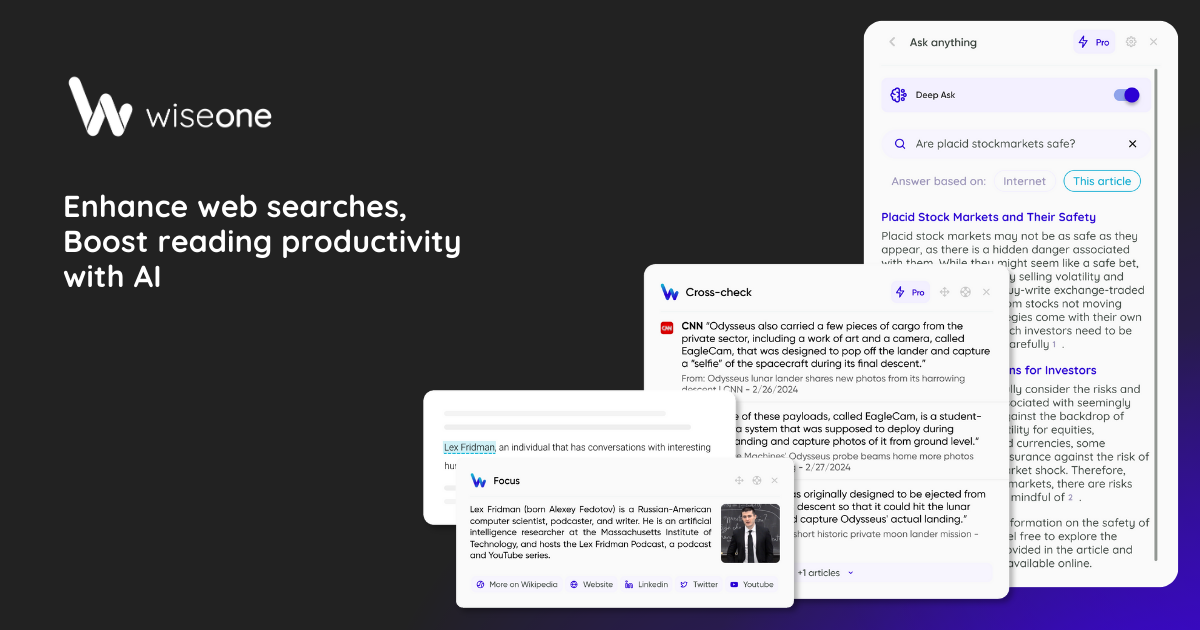Managing infobesity with AI

Infobesity describes the excessive consumption and overabundance of information, often leading to difficulty understanding what we read due to too much content. Infobesity is becoming an increasingly present challenge in both personal and professional spheres, necessitating a deeper understanding of the issue and strategic management.
Understanding infobesity
Infobesity refers to an overload of information. This deluge is largely due to the Internet and the rise of digital media, which offer an endless stream of content, news, social media updates, and more.
Infobesity can impact individuals and organizations. On an individual level, it can result in wasted time, stress, reduced attention spans, and decreased productivity. For organizations, it undermines effective decision-making and inefficiencies and creates a culture of information overload.
The concept of infobesity, or information overload, is introduced as a result of the world's increasing digitization. While its abundance may seem beneficial, it can overwhelm individuals and systems, leading to decreased productivity and efficiency.
The cognitive load theory suggests that our working memory operates with limited capacity, susceptible to overwhelm it when overloaded with information, leading to reduced comprehension and decision-making abilities. Additionally, infobesity contributes to the "paradox of choice," where an abundance of options leads to increased anxiety and decision fatigue. Psychological effects also include stress and burnout, as people struggle to process and make sense of vast information.
Strategies to manage infobesity
Managing infobesity requires a multifaceted approach involving both individual and organizational strategies.
At a personal level, the initial action involves mindful consumption. This entails carefully selecting which sources and forms of information to read or interact with, emphasizing quality over quantity. Other effective strategies include periodic digital breaks and time management techniques and the adoption of AI tools.
Organizations can enhance employee training and advocate for the adoption of data management protocols. They can also leverage data management and AI tools to filter and prioritize information, helping employees concentrate on what's more important.
Crucially, promoting a data-informed culture within the organization is essential, which involves creating an environment where decisions are guided by relevant and quality data rather than being driven by an overload of quantitative information.
Role of AI in managing infobesity
AI plays several roles in both managing and mitigating infobesity:
Filtering: AI helps sort through lots of info by showing you what's most important based on what you like.
Curation: AI picks out relevant content from the Internet and shows it to you, saving you time.
Summarizing: AI can condense lengthy articles, reports, or documents into shorter, more digestible formats, helping you consume key information more efficiently, saving time, and reducing cognitive overload.
PDF summarizers, for example, are extremely helpful tools in this regard, as they can quickly extract the most relevant points from long PDF's, allowing users to grasp the essential content without having to read through every detail.
Reliable information: With the rise of misinformation and fake news, AI tools can help individuals verify the credibility and accuracy of information sources by providing fact-checked information.
Automation: Several AI tools can help with repetitive tasks such as email management, scheduling, and data entry, freeing individuals time to focus on more meaningful information consumption activities.
Embracing tech solutions
In this digital age, practical solutions to manage infobesity include prioritizing information, setting limits, practicing mindfulness, using AI search tools and project management tools, engaging in digital detox, staying organized, and developing critical thinking skills.
Wiseone: AI search & reading copilot

Wiseone is an AI-powered browser extension that allows individuals and professionals to improve the productivity of their search and online reading uniquely and innovatively.
The AI tool was created with the idea that we live in a world of information overload and misinformation and that a technological solution leveraged by AI will be the answer to help web users be more efficient and productive in the way they consume information online.
Every feature in the browser extension is designed to save you time, expand your knowledge, and boost your productivity using the best LLMs available today.
How does Wiseone manage infobesity?
With unique features and a user-friendly interface Wiseone is a convenient tool to manage infobesity, offering an engaging experience that feels like having a companion assisting in every aspect of web searching and online reading.
Saving time with the "Deep Summarize" feature
The feature allows you to understand the main points of an article efficiently without the need to read the entire piece by generating thorough summaries with key takeaways.

Ability to cross-check sources
Cross-check feature verifies the accuracy of the information you read to gain a more comprehensive understanding of the article.
The feature provides access to multiple sources (news and academic) reporting on the same topic. The resources are factual, reliable, and diverse.

Access to factual information with the "Explore" feature.
Wiseone's "Explore" feature is a valuable tool for managing infobesity as it offers quick access to discover related topics, giving users a deeper understanding of any subject.
Wiseone generates a list of recommended resources from different backgrounds, allowing you to navigate additional information effortlessly. The feature saves time and effort searching for related topics while expanding your knowledge.

Simplifying information
With Wiseone's "Deep Ask" feature, you can streamline your web search by asking questions directly related to your reading content, simplifying complex information, and providing clear, sourced answers to even the most complicated questions.

How to get Wiseone
To effectively manage infobesity, follow these simple steps:
- Visit the Chrome Web Store and click on 'Add to Chrome'.
- Once the extension is added, create an account at https://app.wiseone.io/
- Pin the extension and enable it: Click "enable Wiseone," and a quick access button will appear on the right side of your screen.
- Choose how to use Wiseone features: You can access the features using the quick access button or directly from the extension menu.
- Explore beyond limits: Go to any webpage and start using Wiseone. Whether you prefer using the quick access button or the menu, Wiseone assists you in your searches and online reading.
FAQ
What does infobesity mean?
Infobesity refers to the excessive consumption and overabundance of information, often leading to difficulty understanding issues due to too much content.
How does infobesity impact people?
On an individual level, infobesity results in wasted time, stress, reduced attention spans, and decreased productivity.
How does infobesity impact organizations?
For organizations and companies, infobesity undermines effective decision-making and inefficiencies and creates a culture of information overload.
What are the strategies to manage infobesity?
Individuals can start by practicing mindful consumption choosing quality over quantity when selecting information sources. Taking periodic digital breaks and using AI search tools are also helpful.
For organizations, enhancing employee training, adopting data management protocols, and leveraging AI tools can streamline information flow and prioritize important tasks, reducing the impact of information overload.
What's the role of AI in fighting infobesity?
AI manages infobesity through filtering, curation, summarizing, reliable information, and automation.
What is the congnitive load theory?
Cognitive Load Theory is an instructional theory developed by John Sweller in the late 1980s. It aims to provide guidelines for presenting information to encourage learner activities that optimize intellectual performance. The theory is based on human cognition and cognitive architecture, particularly focusing on the limitations of working memory.
Enhance your web search,
Boost your reading productivity with Wiseone



